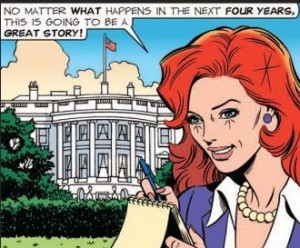Susan B. Glasser writes: There are few women at the top anywhere in America, and it’s a deficit that is especially pronounced in journalism, where women leaders remain outliers, category-defying outliers who almost invariably still face a comeuppance.
Sheryl Sandberg may be a billionaire and a bestseller, but the Facebook COO’s self-help book is not a recipe for success in this or any other field. At least not yet. All of these women in journalism, Abramson perhaps most of all, have leaned in. They paid close attention to those anxiety-producing cover stoirs in the Atlantic about having it all. They looked men in the eye and asked for promotions and raises (well, sorta, kinda, maybe—look what apparently happened when even someone as powerful as Abramson dared to complain. They somehow overcame the stigma of being called bossy as girls, and most of them have balanced both challenging career experiences and raising children at home. They did not lack in confidence—or at least figured out how to project it, even when they weren’t in fact entirely feeling it. In short, these women editors have done most of the things the professional women’s empowerment class recommends.
But still, they were not really able to succeed. They—and I—remained stuck in a trap not of our own making. It’s called editing while female. I said nothing when I worked as an editor and considered myself privileged—if more than occasionally terrified—when I was sent off to cover the war in Afghanistan, and heard the sound of gunfire for the first time while reporting on the battle of Tora Bora. I learned Russian and traveled to Iraq and slept on a hospital roof in Basra with a team of British snipers and co-wrote a book about Vladimir Putin. I edited Roll Call, a newspaper about Congress, in my 20s. I edited the Washington Post Outlook section and Foreign Policy magazine.
I was an optimist, even about the Internet, killer of tradition, and I believed that the bad old days of institutionalized discrimination were mostly behind us. As for the other stuff, the lingering evidence this was not entirely the case, I just avoided it. I didn’t write about how isolated I felt as a young working mom surrounded by older men or how to run a meeting while having a miscarriage. I did not blog about the male editor who told me I shouldn’t worry about having my own slot as a Washington Post foreign correspondent alongside my husband, since I couldn’t possibly hope to be his peer as a journalist anyway. Even when I became a department head and discovered that I was paid less than all of the other senior editors at the Post, I said nothing, because after all, I was younger and I was a woman and I didn’t want it to be about that. And besides, speaking up would mean being judged. And inevitably being found wanting.

